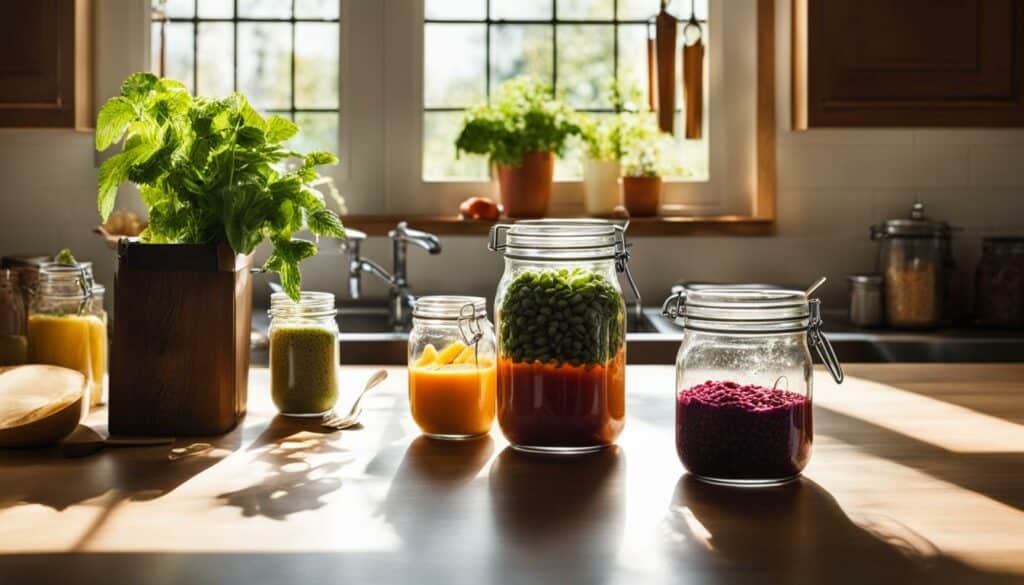Reflecting on my personal responsibility towards our shared environment, I continually find myself drawn to the myriad approaches encompassed by eco-conscious lifestyles. Such ways of living not only embed the principles of sustainable living into the fabric of everyday routines but also kindle a profound respect for nature, nurturing an eco-conscious mindset as I navigate through life.
Understanding that every environmentally friendly choice I make is a stride towards green living, I value exploring various paths like zero-waste initiatives, plant-based diets, and conscious consumerism.
In my view, these aren’t mere trends; they’re transformative habits that contribute to a planet where humanity and wildlife can thrive side by side. With a commitment to learning and adapting, I’m discovering how sustainable living can be personalised and effective in safeguarding our Earth’s future.
Table of Contents
- 1 Embracing Zero-Waste Lifestyle to Minimise Landfill Growth
- 2 Adopting Veganism to Protect Animal Habitats and Reduce Harm
- 3 Self-Sufficiency Lifestyle and Independent Living Footprint
- 4 Eco Conscious Lifestyles Through the Lens of Conscious Consumerism
- 5 Minimalism Lifestyle: A Key Towards Eco-Friendly Living
- 6 Final Thoughts!
- 7 FAQ
- 8 References:
Embracing Zero-Waste Lifestyle to Minimise Landfill Growth
Adopting a zero-waste lifestyle isn’t just about recycling more—it’s has meant restructuring my life around sustainable practices that minimise waste from the outset. By integrating eco-friendly habits into my daily routine, I try to actively participate in reducing what ends up in landfills and, in turn, mitigating environmental pollution.

The Philosophy Behind Zero-Waste Living
Zero-waste living stems from the principle of producing the least amount of waste possible. My goal is to rethink how I consume and to choose options that allow me to reuse, rather than dispose. It’s a path that leads to innovation in daily life, creativity in repurposing items, and mindfulness in consumption choices.
Practical Steps to Reduce Waste in Your Everyday Life
- Opt for a reusable water bottle instead of buying plastic ones.
- Bring cloth bags to the supermarket to avoid single-use plastic carrier bags.
- Choose products with minimal to no packaging, or packaging that is recyclable or compostable.
- Avoid disposable items by investing in quality, long-lasting goods.
- Start composting organic waste to enrich your garden soil.
Zero-Waste Innovations and Community Examples
| Community Initiative | Description | Impact on Reducing Waste |
|---|---|---|
| Local composting programmes | Collective compost bins available for public use | Diverts organic waste from landfills, reducing methane emission |
| Bulk buying co-ops | Enables purchasing of goods without excess packaging | Limits single-use plastics and packaging waste |
| Community repair workshops | Workshops to repair and repurpose items | Extends life of products, reducing the need for new resources |
Adopting Veganism to Protect Animal Habitats and Reduce Harm
As someone deeply committed to eco-friendly living, I’ve discovered that adopting veganism resonates profoundly with my values. It’s not merely a shift in diet; it’s a comprehensive lifestyle that rejects the use of animal products and stands against all forms of animal exploitation. Reflecting on the benefits of this compassionate choice, I recognise its power in safeguarding the habitats of animals and contributing to a healthier planet.

Moving towards a vegan lifestyle, I’ve come to realise that every meal is an opportunity to make cruelty-free choices. It’s more than eschewing meat; it’s about supporting the production of vegan and eco-conscious products, which ultimately contributes to the decline of industrial practices that harm animals and degrade their natural environments.
- Choosing plant-based foods that do not contribute to deforestation or habitat loss
- Supporting beauty brands that have firm anti-animal testing policies and use plant-derived ingredients
- Opting for fashion made from sustainable, animal-friendly materials like bamboo, hemp, or recycled polyester
Even partial steps towards veganism can make a significant impact. By reducing meat consumption and purchasing cruelty-free products, I’m actively participating in the movement towards a kinder, more sustainable world. Here’s a closer look at the choices I’ve made and their benefits:
| Choice | Benefits | Eco-Conscious Impact |
|---|---|---|
| Plant-based Diet | Reduces methane emission from livestock | Decreases the carbon footprint of food consumption |
| Cruelty-Free Cosmetics | Prevents animal suffering | Supports ethical production practices |
| Alernative Clothing Materials | Reduces reliance on leather and fur | Conserves biodiversity and prevents pollution caused by tanning processes |
Embracing the vegan ethic has transformed my approach to daily life, establishing a more profound connection with the environment and the creatures that inhabit it. This journey towards veganism is a clear testament to my commitment to eco-friendly living. Every action counts, and it’s within our collective power to create a more compassionate and sustainable world for all.
Check out my list of Brands that are 100% Cruelty free and Vegan. I tend to update it often so you might want to book mark the link
Self-Sufficiency Lifestyle and Independent Living Footprint
Embarking on a journey towards self-sufficiency can be a rewarding experience, contributing to both personal growth and significant environmental benefits. Striving for an independent living footprint supports sustainable living, pivoting away from the heavy reliance on pre-packaged goods and mass-produced energy. Let’s explore how cultivating a self-sufficient lifestyle can be beneficial for both individuals and our planet.
Benefits of Growing Your Own Food
There’s something irrefutably satisfying about reaping the fruits of one’s own labour. My foray into growing my own produce has shown me the direct benefits of renewable energy sources like sunlight, enriching my appreciation for nature’s efficiency.
By planting a diverse range of vegetables and herbs, I’ve not only curtailed packaging waste but also ensured that my meals are laced with organic goodness. Additionally, the reduction in carbon footprint, when you cut out transportation of store-bought goods, is no small victory for an eco-friendly lifestyle.
Creating and Using Renewable Energy at Home
Living an eco-conscious life compels one to reconsider how energy is consumed. I’ve turned my gaze towards renewable energy options such as solar panels and wind turbines.
The upfront cost may cause a bit of hesitation, to begin with, but the long-term savings and minimal environmental degradation speak volumes. This strategic shift is not only fiscal prudence but a step forward in living a life that complements the Earth’s natural cycles.
Small Scale Self-Sufficient Practices for Urban Dwellers
Taking strides towards self-sufficiency isn’t exclusive to those with sprawling backyards; even as an urban dweller, I find that incorporating sustainable practices into city living is entirely possible.
Balcony gardens, hanging planters, and indoor hydroponics can turn any small space into a verdant produce aisle. Getting involved in community gardens and participating in local energy co-ops can foster a sustainable community spirit and reduce our collective ecological footprint.
In summary, leading a life grounded in self-sufficiency has enlightened me to the robustness and resilience of sustainable living. Whether it’s by nurturing a garden, harnessing wind or sun energy, or engaging in DIY projects that limit reliance on external supplies, each act of autonomy is a testament to the power of individual efforts in worldwide conservation.
Eco Conscious Lifestyles Through the Lens of Conscious Consumerism

Embarking on a journey towards conscious consumerism, I am constantly refining my purchasing decisions to align with more environmentally friendly choices. It’s a lifestyle approach that demands an in-depth understanding of the products I use, their creation, and their journey to my doorstep. It matters to me that what I buy supports sustainable practices and fair working conditions, fostering an eco-conscious mindset.
Through thorough research, I dedicate my support to brands committed to social and environmental well-being. Reaching for items that carry certification labels like Fairtrade, Rainforest Alliance, or are from B Corp businesses ensures my values are mirrored in my shopping habits.
The cumulative effect of individual choices can usher in transformative change, and by becoming a patron of companies that champion eco-friendly habits, I take an active role in shaping a greener marketplace.
Every purchase is a chance to vote for the world I want to live in. By buying locally or from craftsmen and women, the benefits ripple beyond my immediate community, helping to trim down the carbon footprint usually amplified by long-haul transport.
These are the behind-the-scenes stories of conscientious living that invigorate me, converting shopping from a chore into a powerful tool for positive environmental impact.
| Conscious Choice | Impact | Practice Example |
|---|---|---|
| Plastic-free products | Reduction in marine pollution | Using shampoo bars, bamboo toothbrushes |
| Local artisanal goods | Lower transport emissions, support local economy | Purchasing handmade jewellery, local pottery |
| Ethically sourced materials | Promotes fair labour, resource sustainability | Choosing apparel made from organic cotton |
| Fairtrade certified products | Supports equitable trade practices | Buying coffee and chocolate with Fairtrade labels |
Switching to a lifestyle imbued with conscious consumerism has been an enlightening shift, one that empowers me as an individual to make a tangible difference. It is potent proof that my everyday choices, when stitched together with intent and knowledge, can lay the groundwork for a more just and sustainable world.
Check out my list of Brands that use Ethical Mica & practice responsible sourcing of their ingredients. I tend to update it often so you might want to book mark the link
Minimalism Lifestyle: A Key Towards Eco-Friendly Living
Embracing a minimalism lifestyle has become a harmonious complement to the sensual liberation I experienced during the WNBR in London. This lifestyle shift to eco-friendly living transcends mere aesthetic simplicity—it embodies conscious choices that echo the raw, unfiltered connection with the world I felt while cycling, skin bared to the elements.
Just as the act of cycling in the buff on the streets of London was an exercise in authenticity and vulnerability, so too is the practice of minimalism an exercise in intentional living. Each decision to live with less is a nod to the environmental conservation I championed on that ride, a gesture of the same reverence for nature that I carried with me through the city’s veins. Let’s dive into how embracing minimalism—reducing our material burdens as well as the barriers to our true selves—leads to a richer experience of sustainability and personal liberation.
The Environmental Impact of Decluttering
In the process of decluttering, I’ve found that letting go of the superfluous not only clears space in my home but also mitigates my ecological footprint. The act of decluttering leads to a careful evaluation of what I truly need, reducing the volume of waste ending up in landfills and curbing the relentless cycle of consumption and disposal.
Choosing Quality Over Quantity
By adopting the principle of quality over quantity, I’ve prioritised investing in items that offer longevity over disposables that quickly turn into waste. High-quality products might come with a higher price tag, but they save resources and money in the long run. Durability means less frequent replacements and, consequently, reduced waste generation and economic outlay.
Shared Economy: How Less Can Be More
The shared economy has been a revolutionary concept in my journey toward a minimalist and eco-friendly way of life. By participating in systems that favour access over ownership, I actively encourage a culture of sharing, which not only lowers my environmental impact but also fosters community bonds and resilience.
- Carsharing, library services, and tool lending banks minimise the need for individual ownership.
- Choosing to rent or borrow rather than buy decreases the demand for the manufacture of rarely-used goods.
- Embracing the shared economy has revealed that collaboration can lead to significant environmental savings.
Final Thoughts!
Throughout this journey exploring various eco conscious lifestyles, I’ve discovered that each path to sustainability is distinctive yet united by a common purpose: to conserve our magnificent planet and its ecosystems.
Whether it’s embracing a zero-waste philosophy, adopting a vegan diet to protect animals, or practicing minimalism, each lifestyle is a tapestry woven with threads of conscious choice and dedication to green living.
My personal commitment to sustainable living isn’t just reflected in the big leaps but also in the small, everyday decisions. It’s in the rejection of single-use plastics, the local and seasonal produce gracing my plate, and the second-hand items that find a new home with me. These eco-friendly habits may seem modest in isolation, but together, they form a powerful force for change.
Indeed, the embodiment of these practices is not in grand gestures but in the humility of daily life. Whether it’s through energy-saving measures at home or by lessening my meat intake, each step is a stride towards a more eco-friendly existence.
The overall message rings clear: consistent and thoughtful actions, no matter how small, play an instrumental role in the collective endeavour to preserve our world for generations to come.
FAQ
What are eco conscious lifestyles?
Eco conscious lifestyles are ways of living that place an emphasis on making environmentally friendly choices that reduce individual and collective ecological footprints. They encompass various aspects of life, including what we eat, how we shop, and the products we use. These lifestyles are underpinned by sustainable living, green living, and a mindset focused on caring for the environment.
How do zero-waste lifestyles contribute to sustainability?
Zero-waste lifestyles strive to minimize waste production by reducing, reusing, and recycling resources. They aim to prevent additional contributions to landfills and reduce ocean pollution, promoting sustainable practices and eco-friendly habits that prioritize the longevity of our planet.
What is the philosophy behind zero-waste living?
The philosophy behind zero-waste living revolves around the idea of creating minimal waste by incorporating habits that allow for maximal resource utilization. It encourages the refuse of unnecessary items, reduction of waste, reuse of products, recycling of materials, and rot (composting) as core principles.
Can adopting veganism really help protect the environment?
Yes, adopting veganism can significantly benefit the environment. It involves making cruelty-free choices that avoid animal products and exploitation, thereby reducing habitat destruction, lowering greenhouse gas emissions from livestock production, and conserving water and other resources.
What benefits does growing your own food offer?
Growing your own food offers several benefits, including reducing packaging waste, limiting the energy needed for transportation, and ensuring the production of fresh, nutrient-rich produce. It’s a vital part of a self-sufficiency lifestyle that reduces the environmental impacts of conventional farming methods.
What is conscious consumerism and how does it support eco-conscious lifestyles?
Conscious consumerism is the practice of being aware of the ethical and environmental impacts of one’s purchases and supporting brands with sustainable and ethical practices. It aligns with eco-conscious lifestyles by choosing products with lower environmental footprints and supporting businesses that are committed to social and environmental responsibility.
In what ways does the minimalism lifestyle align with eco-friendly living?
The minimalism lifestyle aligns with eco-friendly living by encouraging a “less is more” approach. It advocates for decluttering, which reduces waste, and emphasizes choosing high-quality items that last longer, thereby reducing the need for frequent replacements and minimizing environmental impact.
How does shared economy relate to sustainable living?
The shared economy concept supports sustainable living by promoting the sharing and borrowing of goods and services. This minimizes waste, conserves resources, and reduces the overall consumption of products, fostering a community-centric model of sustainability.
Can small everyday changes make a difference in achieving eco-friendly habits?
Absolutely. Small everyday changes, like using reusable shopping bags, switching to energy-efficient appliances, or eating lower on the food chain can have a significant impact on the environment when practiced collectively. These habits contribute to sustainable living and are critical steps towards an eco-conscious lifestyle.

